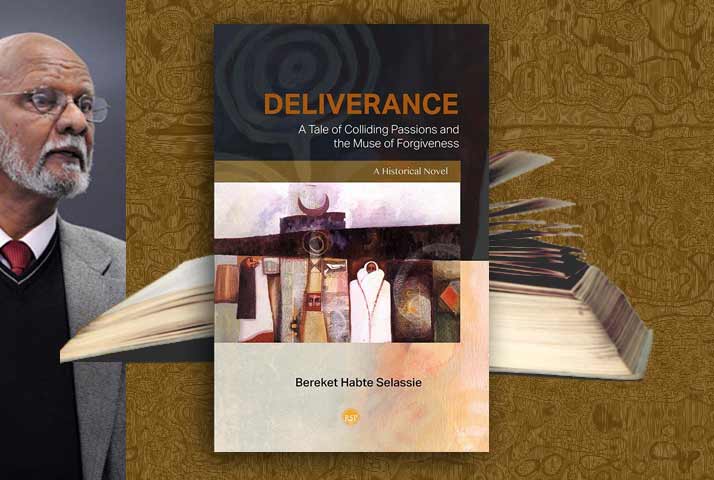Of Kings And Bandits: A Book Review
 The book, Of Kings And Bandits, tells the story of a young Eritrean boy, who was forced to choose between dying in dignity, free and brave, or dying in ignominy, humiliated and afraid. Jemal chose the former; and joined a band of “bandits”, otherwise known as freedom fighters, to defy the tyranny of an oppressive foreign king who had the unconditional backing of The Colossus of the North, the United States of America.
The book, Of Kings And Bandits, tells the story of a young Eritrean boy, who was forced to choose between dying in dignity, free and brave, or dying in ignominy, humiliated and afraid. Jemal chose the former; and joined a band of “bandits”, otherwise known as freedom fighters, to defy the tyranny of an oppressive foreign king who had the unconditional backing of The Colossus of the North, the United States of America.
Jemal’s defiance and courage is reminiscent of the little David rising against the giant Goliath. It is a matchless tribute to the indomitable human spirit and its innate love for freedom. At a surprisingly young age, Jemal figured out that there is time for everything; and the urgency of the time demanded that freedom “be fed with more blood until Janhoi’s injustices has stopped.” Jemal became a child warrior; ready to shed his blood to fertilize the hidden seeds of freedom and dignity that have been bulldozed by American-made tanks and Israeli’s trained commandos.
Jemal’s moral outrage and righteousness did not come as a result of a profound reflection; it was more or less imposed on him. Necessity gave him a rare moral clarity that made his actions quite inevitable as well as predictable. His character and moral compass was shaped and defined by the cruel events that unfolded on daily basis. It was at the tender age of ten that Jemal saw twenty-one Eritrean freedom fighters dangled on a crossbar with their “burned, bloodied, mutilated and smashed faces protruding from their bloated bodies.” This band of brave young men—outgunned and outmanned by Janhoi’s army chose to fight till the last of them dropped dead rather than surrender. Their epic heroism on one hand and Janhoi’s cowardly display of their dead bodies “like dried meat,’ on the other hand was a turning point in the making of a child warrior of Jemal.
Jemal would, of course, subsequently see his own father, uncle and many others being beaten and thrown in jail, and this continual humiliation of his people forced him to look deeper into himself and rediscover his warrior past. His intense moral outrage had made him impervious to any message—including the preaching of religious leaders—that did not address the ongoing injustices committed against his people. He took it upon himself to right what was wrong. He pledged to avenge their suffering and humiliation and restore honor to the most honor-deserving city: Keren and his country Eritrea.
The story mostly takes place in the city of Keren; Jemal’s hometown and birthplace. This is a Kerenite story, but Keren is the microcosm of Eritrea. The open-city and the “hub of caravans” had historically welcomed so many diverse people that have duly learned to live together in peace and harmony. The unceasing bustle of its markets and its dank narrow alleys has given Keren a vibrant culture that has become “a symbol of unity and a cause for spiritual clarity.” The beauty of Keren is not in the whiteness of its landscape, but in the faces of its residents, and the many hues that make up its cultural identity. Laughing and joking are Keren’s enduring and defining characteristics. Kerenites proudly frown upon religious and ethnic bigotry; they actually consider it an “unforgivable offense.”
Keren is a “defiant” and “untamable” city and regardless of how much the Ethiopian king tried to turn it into a “garrison town,” “infected with spies,” it still remained a “bastion of rebellion.” Jemal is Keren and Keren is Jemal.
Jemal, unlike many children of his age all over the world, has stopped dreaming about normal things. His preoccupation was to defend his town and its honor from the enemy determined to tame and subjugate it. The king was not aware of what Jemal was made of; he poked the lion of Keren in the eye, and brought his own downfall. In clear and unambiguous terms, Jemal told the aging emperor, the King of Kings and the Lion of Judea: Don’t mess with Keren.
Keren is the world to Jemal; he loves it with all his heart and soul. He renews his love of Keren “with every rising sun.” Jemal knows Keren but “Keren can be felt only in its narrow streets and alleys… and one needs to sit on the verandas of the many teashops and observe life with its agonies, anxieties, pains and happiness.” Knowing Keren is knowing Jemal, but, above all, it is knowing the so many young men and women who paid the ultimate price to restore the dignity of the people and country they so much loved.
Of Kings And Bandits is a small tribute to all of them and their enormous sacrifices.
This is the story that pays homage to the human virtues of courage, responsibility, sacrifice, honor and love. It is a book that would resonate with all of us regardless of whom we are or where we come from. This transcendental quality is the greatest appeal of the book.
But Of Kings And Bandits is not only a story of Jemal, the making of a child warrior; it is an ambitious project that tries to debunk important mythologies at the heart of the Abyssinian identity. In an iconoclastic and irreligious manner, often cleverly veiled in humor, Johar challenges the Abyssinian heritage that had allegedly victimized “non-Christian people of the region.” He accused scholars of the area who are mostly Westerners and often Christians of compromising true scholarship. “Not many scholars had the will to reconcile the fabricated and biased Abyssinian history.” He takes great pains to make sure that this biased history and identity of a Christian Abyssinia that had rendered Muslims second class citizens in Ad-Habesha (Abyssinia) is explained.
In a very provocative detail, he provides a litany of stories in which “unenlightened peasant Abyssinian kings” unleashed unprecedented miseries upon Muslims and nomadic communities. In an intriguing twist, the heroes from the pages of history would become villains and villains would become heroes. He literally turned Abyssinian history upside-down. It is indeed an interesting perspective to see Ahmed Gragn from a Muslim perspective, a perspective that I’m sure would make those of Abyssinian and Christian stock cringe. But, this is what is needed.
Saleh “Gadi” Johar is a man with a mission and his mission has always been reconciliation. Reconciliation that is based on the truth. The acknowledgement of past injustices is a prerequisite to healing, understanding and reconciliation. No one in Of Kings And Bandits exemplifies this more than Kidane, an Eritrean commandos who became Paul from Saul in the “narrow streets and alleys” of Keren. It is an individual redemption, the building block of reconciliation and harmonious coexistence, and one that truly mirrors and embodies national unity.
Indeed Saleh “Gadi” Johar tells this Kerenite story from the eyes of Jemal. Johar has already been described as one of the best story-tellers of his generation. In Of Kings And Bandits, you will find Johar, the consummate storyteller, with a breathtaking account that is nothing short of a tour de force. The novel is typical of Saleh Johar’s writings, in both form and style, as well as content. It is a bold literary enterprise that effectively combines fun with profundity, and content with style. He paints evocative portraits of various, and often unforgettable characters, and describes the physical, social, political, cultural and economic landscapes of Keren and Eritrea in such a beautiful detail that one feels trapped from the onset.
Of Kings And Bandits is destined to be an instant classic. It appeals to people from different walks of life and will be read by posterity. It has something for everybody. Anyone who reads it will certainly enjoy it and learn something from it. I highly recommend it.
In the words of one of my favorite characters in Of Kings And Bandits: buy and read this “shutuphouse” book; it would “shutuphouse” please you.
weriz@yahoo.com This email address is being protected from spam bots, you need Javascript enabled to view it or Face Book: http://www.facebook.com/semere.habtemariam



Awate Forum